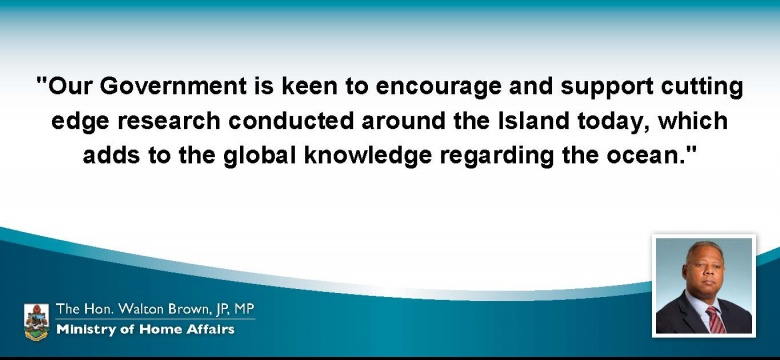
Ministerial Statement by the Minister of Home Affairs, The Hon. C. Walton D. Brown, Jr., JP, MP:
Mr. Speaker, I rise to report on the findings of the Nekton Mission I, XL Catlin Deep Ocean Survey and the Ocean Risk Summit.
Mr. Speaker, This week has been an exciting week for marine science in Bermuda. On Monday, I, as the Minister responsible for the Environment, received the findings of the Nekton Mission I, XL Catlin Deep Ocean Survey in Bermuda.
Since September 2016, scientists drawn from a network of over a dozen participating marine research institutes have collaborated to analyse 40,000 specimens and samples, and 15,000 litres of water samples.
Laboratory analysis revealed the discovery of over one hundred (100) new species including very small animals and dozens of new algal species, as well as black wire coral that stand up to two metres high.
The survey also confirmed a new zone in the ocean, the Rariphotic Zone (Rare Light Zone) from 130 metres to 300 metres.
Just off the coast of Bermuda, the slopes of the Plantagenet Seamount (locally known as 'Argus') were found to have gardens of twisted wire corals and sea fans. There were also sea urchins, green moray eels, yellow hermit crabs and other mobile fauna feeding off zooplankton and algae drifting off the summit and settling on the deep seabed.
Mr. Speaker, considering the Bermuda waters have been comparatively well studied for many decades, these discoveries remind us how much we do not know about the ocean, and are evidence of how important it is to document this unknown frontier to ensure that its future is protected.
The complete results from the XL Catlin Deep Ocean Survey are expected to be published by September 2018.
Mr. Speaker, following on from this, on Wednesday, I had the pleasure of providing welcome remarks for the ground-breaking Ocean Risk Summit, sponsored and led by XL Catlin.
This Summit was the first of its kind, bringing together leaders from around the world with diverse backgrounds and influence to discuss and find solutions to the risks posed to human society by the changing ocean.
Mr. Speaker, the outcomes of the Summit will not only be important for Bermuda but will be globally significant as well…and I hope to report back to you in the near future with some of these outcomes.
Mr. Speaker, last year, several islands to our south were devastated by hurricanes that were some of the strongest ever witnessed in the Atlantic Ocean. Climate scientists agree that warming oceans increased the intensity of these storms. While Bermuda was spared this time, we are nonetheless also very vulnerable to the effects of the changing ocean - not only from more powerful storms but also from more variable weather and precipitation patterns, higher sea and air temperatures, and a steadily rising sea level. Such changes have the potential to severely impact our economy, our way of life and our environment.
Mr. Speaker, beyond the risks driven by climate change we are concerned about our food security, tied to the health of oceanic fisheries. The persistent threat from illegal, unreported and unregulated (IUU) fishing and the impact of plastic waste materials, which accumulate significantly in our Sargasso Sea, threaten these important resources. So, we are just as interested as other countries in finding solutions and ways to mitigate these growing risks.
Bermuda’s role in developing this Summit highlights its leadership position in both the areas of insurance/reinsurance and marine science.
Bermuda’s status as the “world’s risk capital” and the resilience of the Island’s insurance/reinsurance industry continues to be demonstrated, particularly following last year’s catastrophic natural disasters.
Mr. Speaker, Bermuda has been a centre of marine science for nearly 150 years, starting with the Challenger Expedition in 1873, then with the formation of a marine science research station in 1903, the precursor to the Bermuda Biological Station for Research, now the Bermuda Institute of Ocean Sciences. Bermuda has been a place where generations of marine scientists started their training, conducted their research or began their careers. Our Government is therefore keen to encourage and support the cutting edge research being conducted around the Island today, which adds to the global body of knowledge regarding the ocean and can be used to help us make better informed decisions on the use and conservation of our ocean spaces.
One of the important objectives of this Summit was to bring together a broad cross-section of ocean stakeholders to create a truly multi-sectoral approach to protecting the ocean and managing the risk caused by our changing ocean. It was therefore encouraging to have insurance and finance professionals, scientists, politicians, policy makers, lawyers and other ocean leaders from around the globe come to Bermuda to attend this Summit and tackle the challenge together.
Mr. Speaker, I am confident that innovative solutions for mitigating the consequences of ocean risk will result from the discussions held at the Summit and that this will positively impact the quality of life for people around the world.
Finally, Mr. Speaker, I would like to recognise the Honourable member, Mr. Cole Simons, JP MP for his efforts on behalf of Bermuda to lend his support to this initiative when he was the Minister of the Environment. I must also congratulate XL Catlin for their financial support and sponsorship of both the Nekton Mission I, XL Catlin Deep Ocean Survey and the Ocean Risk Summit. Without their foresight and inspiration, these initiatives would not have been possible.
Mr. Speaker, thank you.
